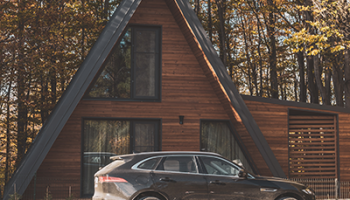Q&A For First Time Homebuyers
First Time State College Home Buyer Q&A
Owning a home is a major financial milestone. Today, most people's wealth is based on building equity in a home. However, buying your first home can be a confusing and difficult process without the right experts to help guide you through it.
Shane Whitteker specializes in State College mortgages. He is the owner and chief broker at State College mortgage broker Principle Home Mortgage.
What are some roadblocks millennial and gen z first-time homebuyers encounter?
Around 55% of millennials and gen z report that they cannot afford to buy a home. A major stumbling block is the high price of homes relative to income. Currently, the median price of a home in the US is around $350,000. Following traditional guidelines, you'd need to make at least $80,000 a year and have saved up $70,000 in cash to buy the median home.
Another stumbling block for the first-time buyer is that the criteria for qualifying for a mortgage were tightened after the housing market crash in 2008, and many younger people are struggling with student loans and other personal debts and thus can find it difficult to qualify for a conventional mortgage.
Whitteker notes a downward trend in marriages could also play a part in reduced home ownership rates among this demographic.
“Marriage rates are also something to be considered,” Whitteker says. “Less people are getting married which means most likely less people have someone to partner with in the purchase of more expensive items like homes, etc.”
Despite these issues, around two-thirds of millennials say they are planning to buy a home in the next two or three years.
What is the most important thing this demographic should understand about home ownership vs. renting?
When renting, your monthly costs are fixed every month and your landlord takes on all of the expense, time, and labor of maintenance and repairs. When owning a home, you need to have sufficient funds on hand at all times to cover the costs of unexpected and planned repairs. You also need to perform all of the maintenance yourself or pay someone else to do it.
“Owning a home is still one of the best ways to grow long term wealth,” Whitteker says. “I think it is a good idea for younger generations to be open to new ideas on how to acquire homes. You don’t have to be married or in a romantic relationship to buy a home with a person. Moving forward, I think we will see more people pooling resources in order to achieve certain financial objectives in life.”
Are all mortgages the same for these first-time home buyers? Which mortgages are better? Why?
There are many different types of mortgages, some specifically tailored to first-time buyers:
- Conventional mortgages
- FHA mortgages are insured and available to buyers with a moderate credit scores
- VA mortgages are available for veterans and require no down payment
- USDA mortgages cover certain non-urban properties
FHA mortgages are a popular type of loan among first-time buyers. For buyers with a credit score over 580, the down payment is only 3.5%; for buyers with a lower credit score, a 10% down payment is required. However, some sellers refuse to sell to buyers with an FHA mortgage, and there are specific criteria the property needs to meet to be eligible. For example, FHA tends to be more critical of property condition than a conventional mortgage would be.
“Overall FHA is usually the easiest type of mortgage to qualify for but is a little bit more strict on the property approval,” Whitteker explains. “I say a little bit more because all mortgages require the property to meet certain standards”.
While advantageous to first time homebuyers, Whitteker notes that FHA loans have been unfairly maligned in the past.
“I have held the opinion for quite a while that FHA mortgage have a weight of bias associated with them,” Whitteker says. “This is largely due to the lack of understanding in the general public that was created decades ago and still lingers.”
If a first-time homebuyer doesn’t have the 20% to put down on a new home mortgage, what should they do?
There are many options for getting around the traditional 20% down payment. Most conventional mortgages don't require such a high down payment anymore; it's more common for buyers to only put down 5%. Fannie Mae and Freddie Mac back conventional loans that only require 3% down for buyers with credit scores over 620. As mentioned above, FHA, USDA, and VA mortgages require no or low down payments.
A popular option among younger people to boost their down payment is to receive a one-time financial gift from a relative, usually a parent.
Potential buyers interested in buying a fixer-upper have the option of financing the purchase and the renovations with a home renovation loan.
Most of these low down payment programs are only available to buyers with a good or excellent credit score. Planning to spend two or three years improving your credit score while saving for a modest down payment is a good financial strategy for first-time buyers.
How does military service potentially impact a first-time homebuyer’s mortgage?
According to Whitteker, if you are a veteran you should apply for a zero down payment VA mortgage.
“The VA sponsors and insures a VA mortgage option which is very competitive and very aggressive,” Whitteker says. “You can get a VA home mortgage with zero percent down payment. If you are a disabled veteran and any VA listed percentage of disability you will not be required to pay the funding fee and still be allowed to qualify with no down payment. The VA does not require monthly mortgage insurance but for non-disabled veterans, there is a funding fee which is determined by the loan to value (down payment percentage).”
During the pandemic, many people were pushed out of their homes due to financial hardship. What options are available to these people to get them back into homes of their own?
The foreclosure moratorium due to COVID-19 expired in July 2021. If you did lose your home, your credit score will drop by around 100 points and it will remain on your record for seven years. If you work hard to improve your credit score while saving up a new down payment, you will become eligible for a mortgage in about three years after a foreclosure.
I want to build our first home - what options are there?
Generally, you would have to buy the land with cash or a traditional mortgage and then take out a construction loan to build the house. While the house is being built, only the interest on the loan has to be paid back. Once the house has been completed, the homeowner can either pay the construction loan back in full or convert it into a standard mortgage.
“As a mortgage broker I do have access to construction loans with FHA, VA, USDA, and Conventional,” Whitteker explains. “Some banks offer in house portfolio loans to facilitate construction of a home. The terms of these portfolio loans differ based on the specific bank.”
If I buy now, would I be able to refinance my mortgage if interest rates drop later?
This is a complex decision. If you wait to buy, you will have lost all of the money you paid out in rent, and it is likely that house prices will continue to increase since there is a substantial housing shortage. If you buy when interest rates are high, your mortgage payments will be higher. You could buy now with a variable mortgage rate that will automatically drop if the prime interest rate drops, or you could just plan to refinance later when interest rates drop, Whitteker says.
“You will be able to refinance if rates decrease or if other circumstances prompt this move,” Whitteker says. “I look at it like this, you can either rent or own. Someone owns the property you are renting, and they are not doing this at a loss or break even; They are making profit. If you own a home, you are receiving the growth in value and avoiding giving someone else profit other than the interest you pay to the bank.”
Why is it almost always better to buy a home sooner rather than later?
If you are paying rent instead of a mortgage, every month that goes by means you have lost the chance to increase your home equity. Conversely, if you have the option to live rent-free with your parents (a pathway many gen z and millennials are following), you have an excellent opportunity to amass a large down payment and get your credit score as high as possible before buying.
Whitteker says it’s all about avoiding missed opportunities to build wealth.
“Home values continue to increase sometimes at a rapid pace,” Whitteker says. “If you wait ten years you will miss out on a significant portion of equity.”
Who is available to help gen z and millennial first-time homebuyers through the process?
Your local mortgage broker is a repository of information about the home buying and mortgage process. Additionally, a good real estate agent is invaluable when buying a home. Good agents know the area and the local market, and they know how the buying process works.
To learn more about the home buying process, speak with the State College mortgages experts at Principle Home Mortgage at (814-308-0959)
A Look At State College VA Home Loans
VA home loans in State College are one of the best ways to finance a home purchase. Available to eligible veterans and their spouses, these mortgages are backed by the Department of Veterans Affairs.
Step-By-Step Guide to Saving Money as a First Time Home Buyer
As a first time home buyer, you'll want to prepare for the process. Our first time home buyer guide is a great place to start!
First Time State College Home Buyer Mortgage Tips: Navigating the Home Buying Process
Navigating the home buying process - in State College or anywhere in Pennsylvania - can be complex. In this article we examine some 'inside tips' to help get you a great mortgage for the home you're dreaming of.




